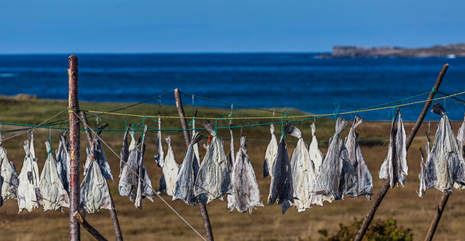Nain, Nunatsiavut

Year(s) Funded: 2012-2013
Topic Area: Mental Health Contact: Government of Nunatsiavut Partners: Government of Nunatsiavut, Nain Inuit Community Government, Labrador Grenfell Health Authority, kANGIDLUASUK Student Program Inc., Nutrition North Canada, Trent University, Nasivvik Centre for Inuit Health and Changing Environments Website: http://www.nunatsiavut.com Title: Aullak, sangilivallianginnatuk (Going off, growing strong) / A Youth-led Enhancement of the Community Freezer Program for Improved Mental Health, Nutrition, and Intergenerational Skills Transmission in Nain
Action: “Aullak, sangilivallianginnatuk” (Going off, Growing Strong) is the first project of its kind in Canada focused on bringing together youth and harvesters to improve a community freezer program. Developed in response to community demand for intergenerational transmission of skills, the youth-led program aimed to help build youth resiliency in the face of widespread social, environmental, and cultural change. The core component of this program was capacity building for youth focused on Inuit Knowledge, culture and values. Youth activities included: trips out on the land with experienced hunters; trips to distribute wild meat to Elders; movie nights where youth socialized with program staff and each other; 12 youth days where youth learn how to make traditional items used to hunt for or prepare country foods; 2 community dinners in celebration of wild foods; and 2 nights helping prepare meats for the community freezer. Results: Youth who participated in this program acquired increased land skills, increased knowledge associated with accessing the land and acquiring resources, increased mental and physical health, and an increased sense of confidence and resilience. In addition, the pilot project led to the implementation of a climate change experiential education component within the kANGIDLUASUk Student Program. This project is about building connections, and exploring the exceptional mental health benefits of land-based activities for youth at risk. Outputs: A draft program report on the implementation and evaluation of our project was published, and with quarterly articles published in the Nunatsiavut Government Environment Division’s ‘Avativut’ newsletter providing updates on the progress of the youth outreach program. |
